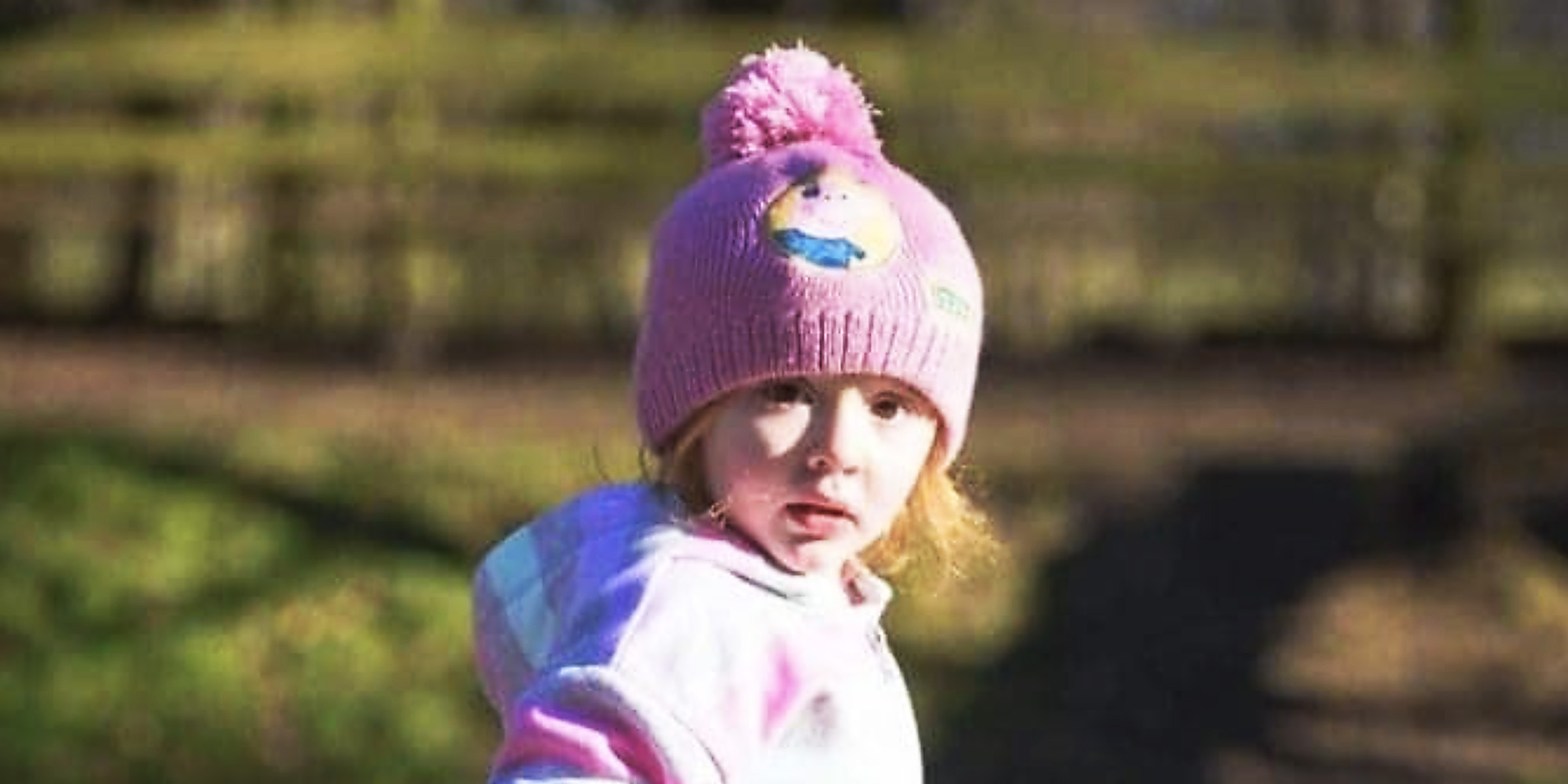
Girl, 3, Dies in Mom's Arms After Misdiagnosis – Now Her Mother Shares What Happened That Day
Within three weeks, she took her daughter to doctors 11 times, but in none of those visits were her concerns treated with the urgency they deserved. She believes that because of that, her daughter wasn't given a fair chance to fight her illness. Now she fights for other children in her daughter's place.
In 2019, a mother's worst fear became reality when her three-year-old daughter died just days after being diagnosed with a rare and aggressive cancer. For weeks leading up to it, her concerns were brushed aside by multiple medical professionals who insisted her daughter was only suffering from constipation.
Since then, the mother has been telling her daughter's story in heartbreaking detail, sharing how repeated missed opportunities led to the worst possible outcome. Through public advocacy and a charity created in her daughter's name, she's spent the past six years turning unimaginable grief into action, determined to ensure other families don't endure the same fate.
The Early Signs the Doctors Missed
It began in early June 2019, just weeks after Aoife Flanagan-Gibbs and her family had settled into their new home in Rayleigh, Essex. The three-year-old started to experience intermittent stomach pain, which didn't seem serious at first. Her mother, Eilish Flanagan, brought her to the doctor for medical attention.
But what was initially believed to be a minor issue turned into a pattern of repeated visits. Over the next three weeks, Flanagan took Aoife to see doctors 11 times. They visited a general practitioner, an emergency GP, a minor injuries unit, and the emergency department.
Each time, she shared her concerns about her daughter's pain and declining energy. And each time, they told her the same thing. "She'd been in and out of hospital [sic] with different infections and problems, but they kept telling us she had common child constipation," Flanagan later explained.
Doctors offered reassurance and suggested adjustments to Aoife's diet and routine. Flanagan was told that her daughter might need more fiber or physical activity. But Aoife had always been active. She spent time outdoors every day riding her pony, Bubbles, and helping out on the family's small farm. None of the advice explained why she was getting worse.
Ignored Symptoms and Escalating Pain
As the days passed, Aoife's condition visibly declined. Her stomach pain became more severe, and she began experiencing discomfort in other areas of her body. Flanagan also noticed a lump near her daughter's bottom, but despite her efforts to bring it to the doctors' attention, it was never examined.
"As a mother, I knew there was something else wrong," she said. By early July, Aoife was admitted to Southend Hospital. That night, Flanagan was told again that her daughter's issues might come down to poor diet or low activity levels. The suggestion felt dismissive, especially given Aoife's daily routine on the farm.
It wasn't until doctors ordered imaging tests that the truth was revealed. An X-ray showed a tumor in Aoife's liver that was obstructing her bowel. The condition was far more advanced than anyone had previously considered, and it was the first time her parents were shown just how serious it really was.
Reflecting on those weeks, Flanagan later shared that she had specialists' support from Great Ormond Street Hospital, who believed that the signs should not have been missed. "We saw as a family... that the doctors should never have missed what was wrong with her," said Flanagan.
The Diagnosis That Came Too Late
Following the results of the X-ray, Aoife was transferred to Great Ormond Street Hospital in London for further evaluation. It was there, after weeks of uncertainty, that doctors finally identified the cause of her illness. Aoife was diagnosed with germ cell cancer, a rare type of tumor that, in many cases, responds well to chemotherapy if caught early.
Germ cell tumors begin in cells that are present in the body before birth. They form early in fetal growth. These cells are meant to develop eggs in females and sperm in males. In some cases, the cells don't stay where they're supposed to. Instead, they migrate to other areas of the body and grow into tumors.
When these tumors appear outside the ovaries or testicles, they're called extragonadal germ cell tumors. These types of tumors can develop in several areas, including the brain, chest, lower spine, abdomen, or even the neck.
Though rare, they can be either benign or malignant. In children, they often go undiagnosed because their symptoms can resemble more common conditions.
Typical signs can include:
- Stomach pain
- A lump or swelling
- Constipation
- Trouble urinating
- Nausea and vomiting
- Chest pain or cough
- Pain in the lower back or spine
- Fatigue
- Weight loss without explanation
Depending on the tumor's location, the symptoms may vary. Some tumors also affect hormone levels, which can lead to things like early puberty, missed periods, or abnormal hair growth.
In Aoife's case, the tumor should have been detected much earlier due to its location. At first, when she was diagnosed, there was a sense of cautious hope. Specialists explained that germ cell tumors often react quickly to treatment. But for Aoife, time was no longer on her side.
The cancer had already spread, and her small body was struggling to keep up. "They didn't give us a fair chance," Flanagan stated. If they had caught the cancer earlier, her chances of survival might have been different. Germ cell tumors can lead to serious, lasting complications if not treated promptly.
In some cases, treatment or the disease itself can cause long-term problems, such as developmental delays, learning difficulties, nerve damage, or infertility. For Aoife, the chance to face those challenges never came.
Aoife had lost a noticeable amount of weight and was growing weaker, but she continued to fight. Although frightened and tired, she remained determined. Her mother described her as brave and strong, even in those final days.
Her Final Moments in Hospital
Aoife spent just a few days at Great Ormond Street Hospital before her condition took a sudden turn. On July 7, 2019, only five days after receiving her diagnosis, she went into cardiac arrest. Her mother had been at her side the entire time and sensed that something was wrong. In that moment, there was nothing more doctors could do.
"She died in my arms," Flanagan revealed. But even as she stepped out of the hospital that night, she knew her daughter's story couldn't end there. The shock and grief were overwhelming, yet she felt a deep urgency to do something. "Her life on this planet, that couldn't just be it. We needed to do something for the other children," stated Flanagan.
Turning Grief Into Action
In the days that followed Aoife's death, Flanagan made a decision that would shape her daughter's legacy. She arranged for parts of Aoife's organs, tissue, and tumors to be donated to researchers. She hoped that the information could help doctors better understand germ cell cancer and possibly lead to earlier diagnoses and better outcomes for other children in the future.
Soon after, she began laying the groundwork for what would become Aoife's Bubbles, a charity named after Aoife's beloved Shetland pony. It would go on to become the United Kingdom's first and only organization focused on raising awareness of germ cell cancer.
Through it, Flanagan set out to educate families and healthcare professionals alike about the disease, its symptoms, and how to spot it before it's too late.
"It's not about blame or anger, it's about accountability," she said. That sense of responsibility, to help prevent another family from enduring what hers did, became the driving force behind the foundation.
Since its founding, Aoife's Bubbles has grown into more than just a charity. It has become a community of support and awareness built around the memory of a little girl who loved ponies, Paw Patrol, and Queen Elsa from "Frozen." Flanagan has worked tirelessly to ensure her daughter is remembered not just for how she died, but for how she lived.
"She was very much a wild child," Flanagan shared. "She was so happy, bubbly, and bouncy. And the best word to describe her is kind." She also added, "We'd just been to the cinema to see the movie a week before she was diagnosed, and she loved it."
In October 2021, the family hosted Aoife's Enchanted Ball, a "Frozen 2"-themed fundraiser held at Parkwood Golf Club in Kent. The event brought together 250 guests to celebrate Aoife's life and raise money for the charity. It had taken two years to plan, and for Flanagan, it was a deeply emotional milestone.
"Aoife—a room filled with 250 people all for you," she wrote in a post shared just before the event. "So many people have poured their hearts and souls into this… for you. I'm humbled, honoured and beyond grateful. All my love my darling."
From public speaking engagements to community fundraisers, Flanagan has continued to share Aoife's story with honesty and purpose. She always returns to the idea that even one more day, or one earlier test, might have changed everything.
Another parent knows this heartbreak all too well. In 2016, Kayla Dunham lost her two-year-old son, Grayson, after what began as a routine stomach bug was repeatedly misdiagnosed. By the time doctors identified the real cause, it was too late. She now urges other families to speak up, ask questions, and act fast when something feels wrong.
The information in this article is not intended or implied to be a substitute for professional medical advice, diagnosis or treatment. All content, including text, and images contained on news.AmoMama.com, or available through news.AmoMama.com is for general information purposes only. news.AmoMama.com does not take responsibility for any action taken as a result of reading this article. Before undertaking any course of treatment please consult with your healthcare provider.
